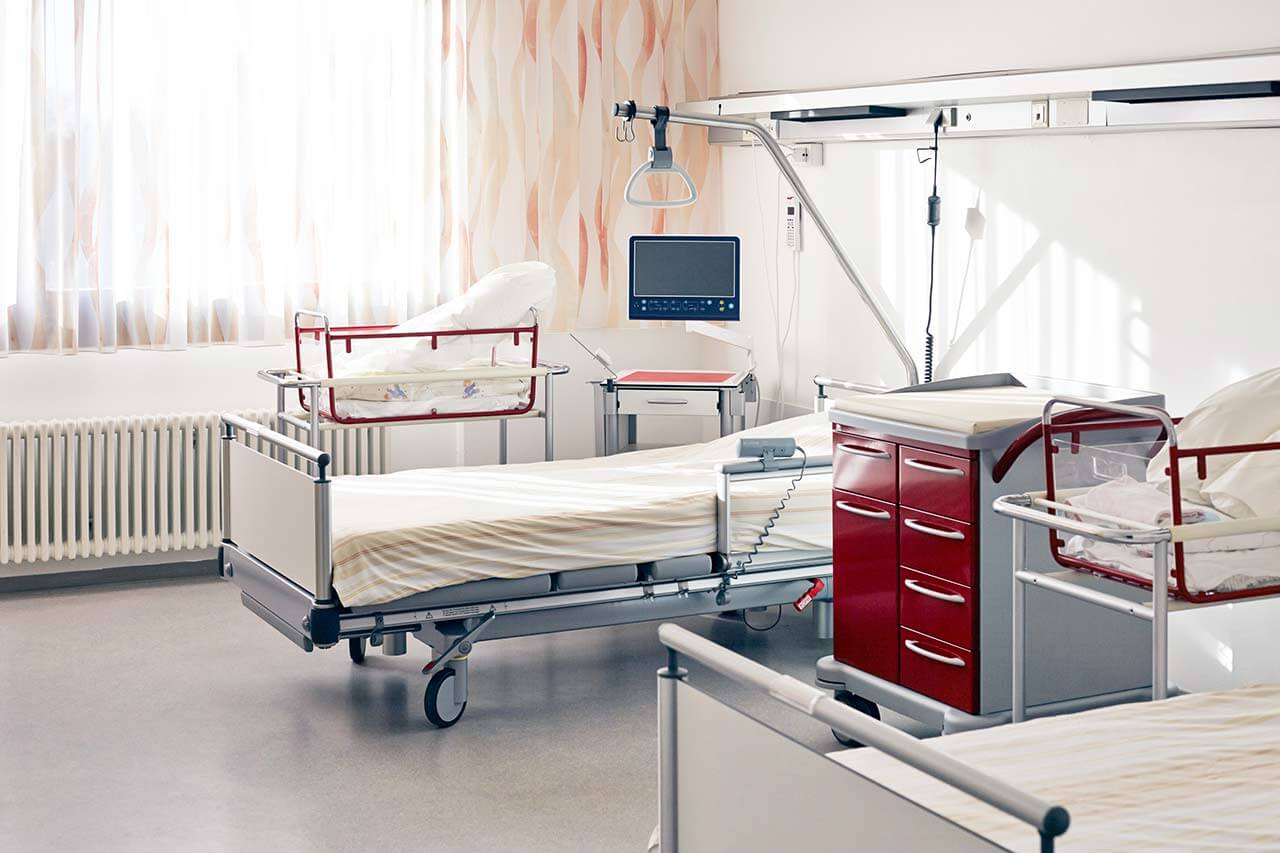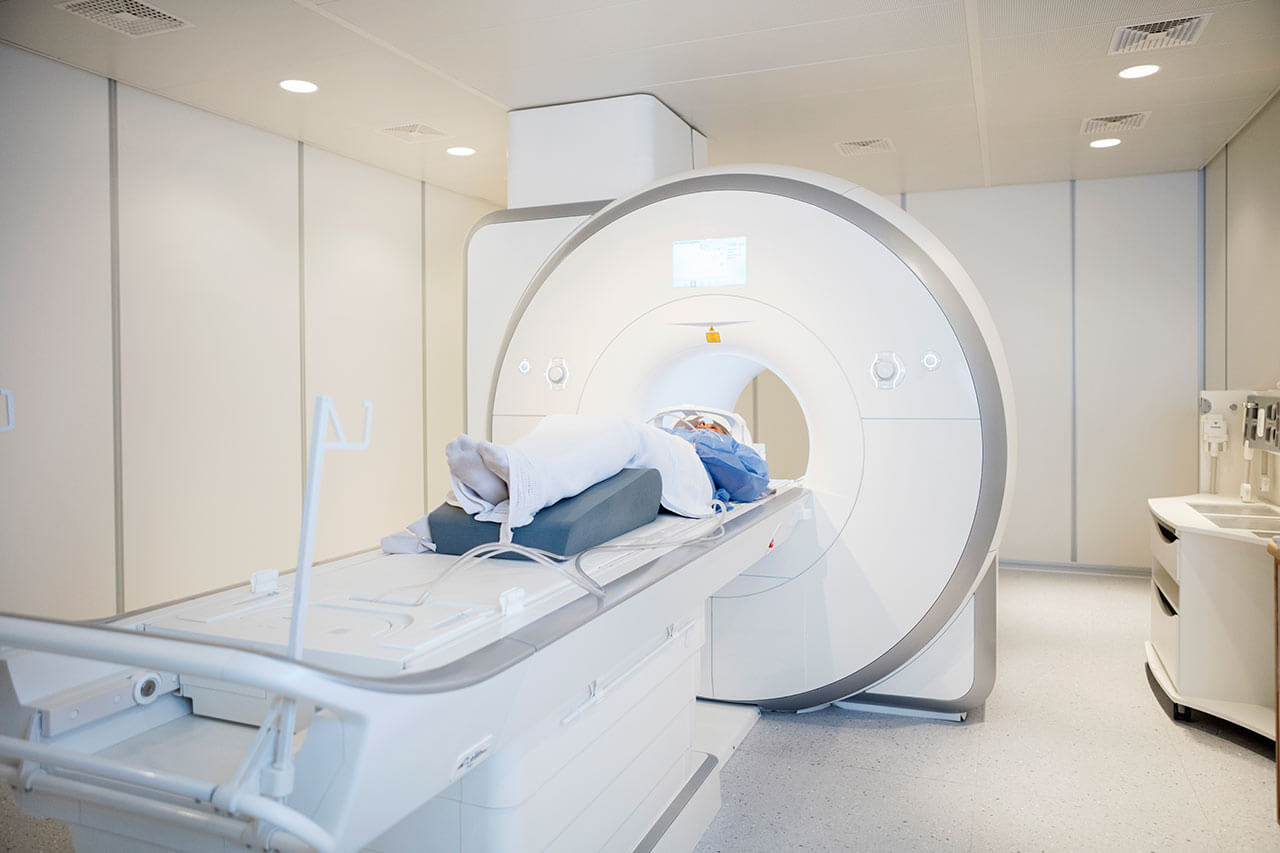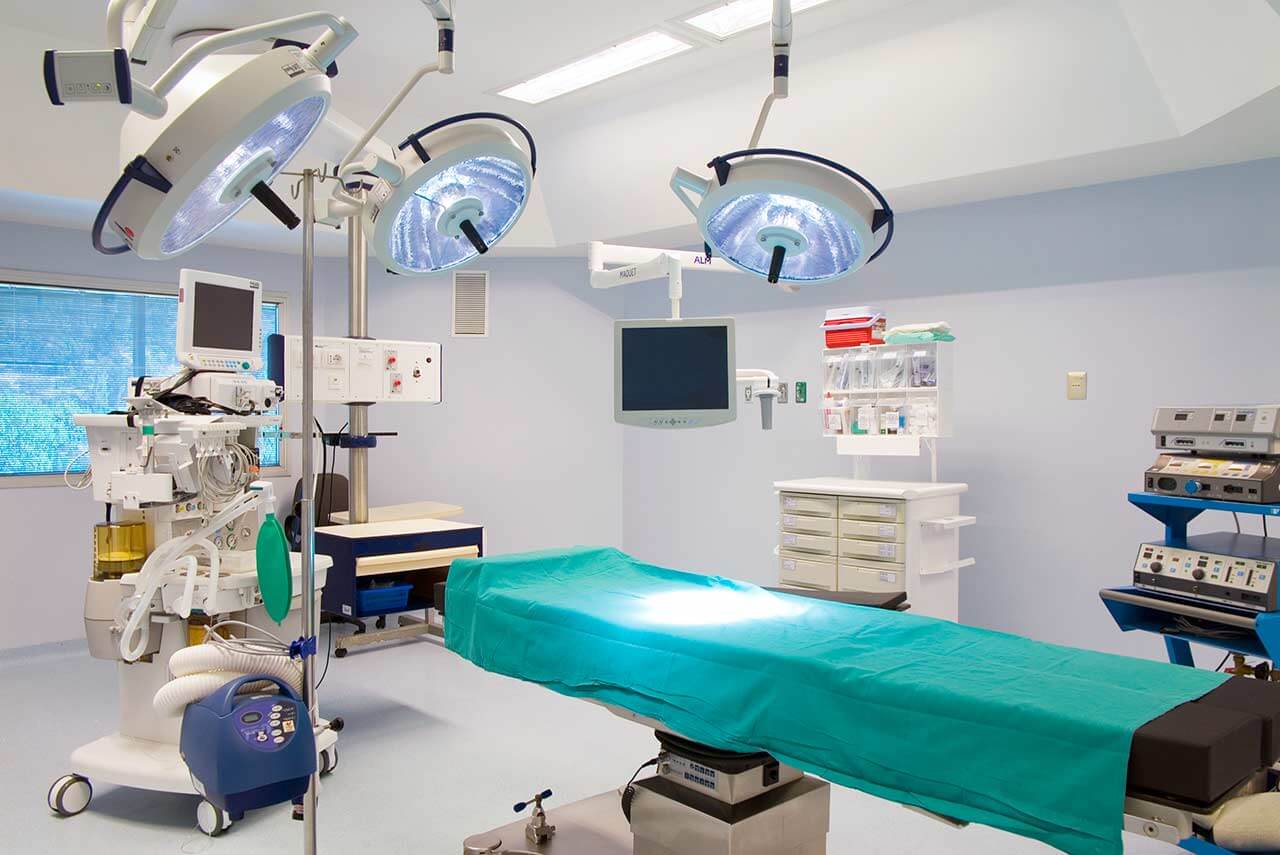
The program includes:
- Initial presentation in the clinic
- clinical history taking
- review of medical records
- physical examination
- laboratory tests:
- complete blood count
- general urine analysis
- biochemical analysis of blood
- TSH-basal, fT3, fT4
- tumor markers
- inflammation indicators (CRP, ESR)
- indicators of blood coagulation
- abdominal ultrasound scan
- CT scan/MRI or PET-CT of abdomen
- preoperative care
- cytoreductive surgery to remove visible tumors
inside the abdomen and HIPEC - histological and immunohistochemical
examination of removed tissues - symptomatic treatment
- cost of essential medicines
- nursing services
- stay in the hospital with a full board
- accommodation in a 2-bedroom ward
- elaboration of further recommendations
How program is carried out
During the first visit, the physician will conduct a clinical examination and go through the results of the available diagnostic tests. After that, you will undergo the necessary additional examination, such as the assessment of liver and kidney function, ultrasound scan and tomography of the abdominal organs. Based on the results of the examination, the physician will choose the surgical technique and the type of anesthesia. After that, preparation according to the preoperative standard will start.
Cytoreductive surgery begins with general anesthesia. The intervention is performed as open surgery, i.e. through the incision in the anterior abdominal wall, so that the surgeon can carefully examine the peritoneum and the surface of the abdominal organs. The surgeon removes affected by the malignant process ovaries, areas of the peritoneum and metastases in other internal organs. This stage of the operation can take several hours, since the overall effectiveness of the treatment depends on the completeness of the malignant tissues removal.
At the next stage of the operation, the surgeon inserts several catheters into the abdominal cavity. Through the catheters, a heated solution of a chemotherapy drug is pumped inside. The special system maintains the required temperature (42-43 degrees Celsius), pressure and circulation rate of the medicinal solution. The solution mechanically flushes out blood clots and remnants of malignant tissues, and a heated chemotherapy drug destroys micrometastases in internal organs and lymph nodes (micrometastases can’t be detected by the naked eye).
After 1-1.5 hours, the chemotherapy drug is removed from the abdominal cavity and the abdominal cavity is washed with saline. After that, the surgeon removes the catheters and sutures the incision of the anterior abdominal wall.
After the completion of the operation, you will be transferred to the ward of the intensive care unit, under the round-the-clock supervision of doctors and nurses. In 1-3 days after the operation, your drains will be removed and you will be transferred to a regular ward for further recovery. The whole treatment takes 10-12 days on average.
Finally, the attending physician will evaluate the results of control examinations, schedule the date of discharge from the hospital and give you detailed recommendations for further follow-up and treatment.
Required documents
- Medical records
- MRI/CT scan (not older than 3 months)
- Biopsy results (if available)
Service
You may also book:
 BookingHealth Price from:
BookingHealth Price from:
About the department
The Department of Gynecology and Obstetrics at the Hospital Cologne-Holweide offers top-class medical care for women with diseases of the reproductive system and also provides the full range of obstetric services. The department houses a highly specialized center that admits women with oncologic diseases of the reproductive system such as uterine, cervical, ovarian, and vaginal cancers. The department's team of gynecologists has vast experience in the treatment of gynecologic oncology, as well as all the necessary resources and the very latest treatment methods for complex cancer cases. The department's specialists also diagnose and treat benign gynecologic diseases, including uterine fibroids, endometriosis, urinary incontinence, and pelvic organ prolapse. A team of obstetricians delivers more than 1,800 babies every year, regularly dealing with complex pregnancies and multiple pregnancies. The department is one of the largest and best maternity centers in North Rhine-Westphalia. Expectant mothers can anticipate not only highly professional and caring medical staff but also comfortable delivery rooms and cozy patient rooms here. The department is headed by PD Dr. med. Michael Mallmann.
An integral part of the department's clinical practice is the treatment of oncological diseases of the female reproductive system. The doctors at the medical facility give preference to an interdisciplinary approach, so each clinical case is considered at tumor boards with the participation of gynecologists, oncologists, surgeons, radiation therapists, and other specialists. Such an approach allows for the development of the most effective treatment regimen, taking into account the peculiarities of the specific clinical case. The basis of a treatment regimen for uterine, cervical, ovarian, and vulvar cancers is a surgical intervention. Women with advanced cervical cancer undergo a radical hysterectomy, or Wertheim's hysterectomy; uterine cancer requires surgical removal of the uterus and ovaries; and a standard intervention for ovarian cancer is extended uterine extirpation combined with omentectomy (removal of the greater omentum). Vaginal cancer is extremely rare. Patients with this oncological disease most often need tumor resection, but in complex cases, they may require the removal of the entire organ along with the uterus and partial resection of adjacent organs if they are affected. Gynecologic cancer surgery is almost always complemented by chemotherapy, radiation therapy, targeted therapy, and other conservative treatments.
Patients with benign gynecologic diseases such as uterine myomas, endometriosis, urinary incontinence, and pelvic organ prolapse can also undergo treatment in the department. Conservative treatment can often be successfully conducted for these conditions. For example, uterine myomas and endometriosis are well treated with hormone therapy, and bladder prolapse can be eliminated with therapeutic exercises, electrical stimulation, and drug therapy. However, in some clinical cases, the above-mentioned techniques are ineffective, and surgery is the only treatment option. Surgical interventions for benign gynecologic diseases are performed in the department using minimally traumatic laparoscopic techniques, in most cases on an outpatient basis.
The department's team of obstetricians is responsible for prenatal diagnostics, comprehensive management of pregnancy, childbirth, and postpartum care for both mother and child. At the stage of pregnancy management, expectant mothers are provided with consultations and ultrasound screenings in all trimesters of pregnancy. In addition, invasive tests such as chorionic villus sampling and amniocentesis are available in the medical center to exclude congenital malformations in the baby at the stage of intrauterine development. The department has five delivery rooms equipped with comfortable birthing chairs. There is also one room specifically designed for water births. The department's obstetricians give preference to natural childbirth, but if necessary, a C-section may be performed. During labor, the specialists make every effort to alleviate pain, so patients are offered acupuncture, homeopathy, aromatherapy, and other methods to ease the childbirth process.
Premature babies and infants with congenital abnormalities are taken care of within the Level I Perinatal Center. Neonatologists, pediatric surgeons, and pediatricians with various specialties take care of the young patients here. The Neonatal Intensive Care Unit is located in close proximity to the delivery rooms, enabling immediate assistance in cases of post-birth complications endangering the child's health or life. The Perinatal Center was founded back in 1990, and at that time, only 4 beds were available here. As of today, it has 10 beds, and more than 450 newborns and premature infants, including about 100 babies with a body weight of less than 1,500 grams, receive medical care here. The Perinatal Center has the status of being one of the best and largest in all of Germany.
The department's range of medical services includes:
- Gynecology
- Diagnostics and treatment of malignant gynecologic diseases
- Cervical cancer
- Uterine cancer
- Ovarian cancer
- Vaginal cancer
- Diagnostics and treatment of benign gynecologic diseases
- Uterine fibroids
- Endometriosis
- Pelvic organ prolapse
- Urinary incontinence
- Diagnostics and treatment of malignant gynecologic diseases
- Obstetrics
- Prenatal diagnostics
- Ultrasound examinations in all trimesters of pregnancy
- Invasive procedures: chorionic villus sampling and amniocentesis
- Comprehensive management of pregnancy
- Childbirth: natural childbirth, including water birth, and C-section
- Postpartum care for both mother and child
- Prenatal diagnostics
- Other medical services
Curriculum vitae
Since June 2023, PD Dr. med. Michael Mallmann has been heading the Department of Gynecology and Obstetrics at the Hospital Cologne-Holweide. The doctor graduated from the University of Cologne. After obtaining his doctorate, he worked as a Research Fellow and Physician in the Department of Obstetrics and Gynecology at the University Hospital Bonn. In 2016, Dr. med. Mallmann held the position of Senior Physician and then Managing Senior Physician in the Department of Gynecology and Obstetrics at the University Hospital Cologne.
The doctor completed his internships at the Memorial Sloan Kettering Cancer Center in New York, LIMES (Life & Medical Sciences Institute) at the University of Bonn, and Harvard Medical School in Boston. Dr. Mallmann completed his habilitation in Gynecology and Obstetrics at the Faculty of Medicine of the University of Bonn.
PD Dr. med. Michael Mallmann is board certified in Gynecology and Obstetrics and has additional qualifications in Obstetrics and Gynecology, Gynecologic Oncology, and Tumor Drug Therapy.
Photo of the doctor: (c) Management-Krankenhaus
About hospital
According to the reputable Focus magazine, the Hospital Cologne-Holweide ranks among the top medical centers in North Rhine-Westphalia!
The medical complex is an academic hospital of the University of Cologne, providing patients with high-quality healthcare based on the latest achievements in university medicine. The hospital admits patients with various diseases, including cancer, diseases of the hematopoietic system, urinary system, gastrointestinal tract, ENT organs, etc. The hospital is known for having one of the largest Departments of Obstetrics in Germany, where more than 1,800 babies are born every year. The health facility also houses the specialized Breast Cancer Center and the Colon Cancer Center, whose treatment success rates are consistently high. The hospital has advanced technical resources and highly qualified staff to provide patients with effective medical care in the areas of its specialization.
The hospital has a total of 465 beds. The medical facility annually admits about 20,500 inpatients and more than 63,900 outpatients for diagnostics and treatment. The hospital provides comfortable conditions and modern infrastructure to meet the needs and wishes of patients. The medical team at the hospital prefers a multidisciplinary approach to medical care, which is particularly valuable in treating complex conditions such as cancer.
In 2009, the hospital was successfully certified by "High-Quality Management of Acute Pain Syndrome" TÜV Rheinland Group in gynecology, surgery, urology, otorhinolaryngology, and anesthesiology. In addition, the hospital became the first emergency medical facility for adults in Cologne to be KTQ® (Cooperation for Transparency and Quality in Healthcare) certified.
The specialists at the hospital always strive to provide each patient with high-quality medical care in a pleasant atmosphere. Doctors are open to dialog, gladly answer all questions that patients are interested in, and provide moral support throughout the therapeutic process.
Photo: (с) depositphotos
Accommodation in hospital
Patients rooms
The patients of the Hospital Cologne-Holweide live in comfortable single and double rooms designed in light colors. Each patient room has an ensuite bathroom with a shower and a toilet. The furnishings of a standard patient room include an automatically adjustable bed with an orthopedic mattress, a bedside table, a wardrobe for personal belongings, a table and chairs for receiving visitors, and a TV with international channels. Wi-Fi is also available in the patient rooms.
The patients can stay in enhanced-comfort rooms, if desired. Such rooms are more spacious and additionally equipped with a safe, a mini-fridge, and upholstered furniture.
Meals and Menus
The patients are offered three tasty and healthy meals a day: breakfast, lunch, and dinner. Breakfast and dinner are served as buffets, and for lunch, there is a set of three menus to choose from.
If, for some reason, you do not eat all the foods, you will be offered an individual menu. Please inform the medical staff about your dietary preferences prior to treatment.
Further details
Standard rooms include:
Religion
A worship service is held in the chapel at the hospital every Sunday. There is also a prayer room at the hospital where one can pray in private.
The services of representatives of other religions are available upon request.
Accompanying person
Your accompanying person may stay with you in your patient room or at the hotel of your choice during the inpatient program.
Hotel
You may stay at the hotel of your choice during the outpatient program. Our managers will support you for selecting the best option.





